Who is who? Armenia on the eve of election
Parliamentary election in Armenia is scheduled for April 2. This will be the first election after the constitutional changes in the country, as a result of which Armenia is going to switch to the parliamentary model of government.
From now on, the Parliament (National Assembly) will elect country’s President for the period of 7 years, whereas the President will appoint the Prime Minister, nominated by the election winner party or bloc.
The future Parliament will be elected through the proportional system. The National Assembly will comprise at least 101 MPs. There will be a guaranteed stable majority-a political party that will gain 54 % (and more) of votes.
If not, there will the second round of election. The political forces, that have overcome the first round, will unite in blocs and stand in the second round. The election threshold for a party makes 5%, whereas for a bloc- 7%. 4 MP mandates will be allotted to national minorities (Yazidis, Russians, Assyrians, Kurds).
The election campaign was launched in Armenia on March 5.
Among those, who stand for election are 5 political parties
- Republican Party of Armenia
- ‘Armenian Revival’
- ARF ‘Dashnaktsutyun’
- Free Democrats”
- Communist Party
and 4 blocs
- ‘Armenian National Congress-People’s Party of Armenia’
- ‘Yelk’
- ‘Tsarukyan’
- ‘Ohanyan-Raffi-Oskanyan’
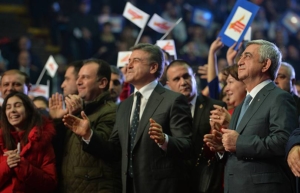
According to Alexander Markarov, a political analyst, apart from its internal resources, the Republican Party of Armenia also makes use of positive image of those, who are included in the political forces’ proportional list. Namely, in the political analyst’s opinion, “Armenian Defense Minister, Vigen Sargsyan, enjoys positive reputation both, in the country and beyond its borders.”
The RPA’s rivals, like, for example, the opposition Armenian National Congress members, also believe that the party takes advantage of the image of those, who are on the party’s proportional list, pointing at Prime Minister Karen Karapetyan. Former top-manager of the Russian Gazprom, who had nothing to do with the domestic Armenian oligarchic groups, was brought back to Armenia by the RPA in 2016. And it was already clear then that he would be assigned a key role in attracting the electorate during the parliamentary election.
Alexander Markarov believes that the RPA will aspire for a stable majority, “but if it fails to achieve that in the first round, it will try to use the potential of other political forces.”

Alexander Iskandaryan, a political analyst, believes that the electorate of Artur Baghdasaryan, who is “pledging free education, medical services and other fairy things, is thinning out. People less believe in fairy tales and sink into apathy, whereas apathetic people tend to vote non-ideologically. Yet, theoretically, the Armenian Revival
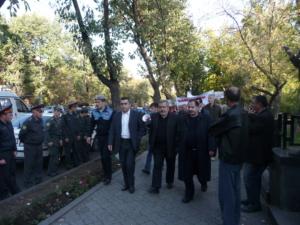
Political analysts believe that creation of a coalition between the ruling Republican Party of Armenia and ARF Dashnaktsutyun, has been step towards formation of a group that should win the election.
Ruben Mehrabyan, a political analyst and expert at the Center for Political and International Studies, believes that Dashnatsutyun decided to cooperate with the RPA to ensure its presence in the Parliament of next convocation, since it doesn’t possess sufficient resources for an individual struggle.
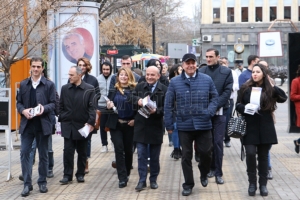
According to Garik Keryan, Professor and Doctor of Political Sciences, what makes the Free Democrats’ program different from others is that it focuses on the foreign policy issues. Namely, the party suggests that Armenia should quit the Eurasian Economic Union (EAEU) and stresses the need for cooperation with NATO.
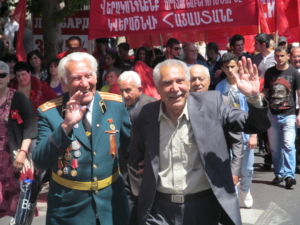
Hayk Khanumyan, an expert, believes that the Communist Party of Armenia stands no chances to get into Parliament, even 1% of votes will be a great success for it. Unlike other post-Soviet republics, the Communist Party of Armenia has weakened since the 90s and is almost in no way represented in country’s political life.
Hrant Mikaelyan, a political analyst and research fellow at the Caucasus Institute, is sure that the Communists won’t get into the Parliament. In his opinion, the Communist Party’s message is incomprehensible to the community. They don’t have recognizable figures, they have failed to attract new generation and rebrand.
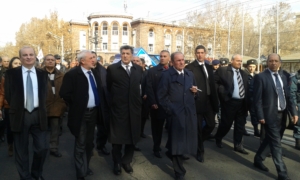
Hayk Khalatyan, an expert, pointed out that in its election campaign, the ANC-PPA bloc focuses more on the peaceful resolution of the Karabakh conflict, which implies considerable concessions. Their result will be a kind of test: which part of the Armenian community is ready to make concessions on Karabakh issue. They will find it hard to get 7% without help from the outside. For many years they were regarded as the leaders of the traditional radical opposition, but they strongly discredited themselves in the community by their unsuccessful struggle and some kind of shady deals with the authorities.”
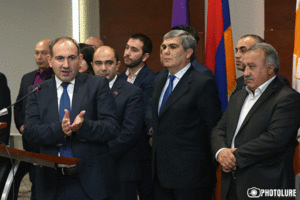
According to Sergey Minasyan, Deputy Director of the Caucasus Institute, ‘Yelk’ bloc is one of the contenders for the third place in Parliament after the Republican Party of Armenia and ‘Tsarukyan’ bloc. The bloc holds itself out as a pro-western party, trying to act as the third force, that doesn’t affiliate itself either to the traditional opposition or the government. They are seeking to occupy a niche that will be appreciated by the voters of Yerevan center- educated, active, unmarred by corruption, realistic enough, not calling for riots and civil war. But they won’t be able to replace the Republicans in the elections.
Armen Badalyan, a political strategist, in turn, believes that ‘Yelk’ bloc is technical and has no political orientation. In his opinion, the bloc is lacking its individual ‘brand identity’, despite that the top three individuals in the party list are well-known on the political field.
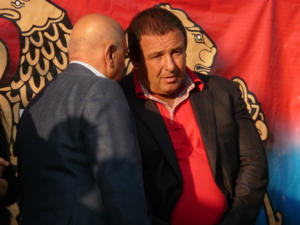
Hayk Khalatyan, an expert, believes that Gagik Tsarukyan’s image of a benefactor plays in his favor. He has been actively engaged in charitable activity in Armenia for years and therefore the majority of the population have a liking for him. His bloc brings together te individuals who have the upper hand, financial capacity and authority.
Gagik Tsarukyan quitted politics in 2015, after being criticized by the Armenian President, Serzh Sargsyan. Just ahead of the parliamentary election, Tsarukyan announced about his intention to return to politics, which, as Sergey Minasyan put it, was ‘quite expected’. The Prosperous Armenia Party will not work within the framework determined or planned by the authorities. I don’t know, whether there was a preliminary agreement or not, what rates or scope the matter concerned, but it’s quite clear that Gagik Tsarukyan has returned by agreement and he is well-aware of the format and limits, within which he can and should work. This is not the RPA’s framework, but rather that of the opposition.
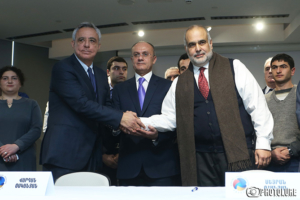
Hayk Khalatyan, an expert, notes that, on the one hand, ‘Ohanyan-Raffi-Oskanyan’ alliance is very radical with regard to the incumbent authorities, and, on the other hand, the fact that the bloc leaders, Seyran Ohanyan and Vardan Oskanyan, used to be part of the ruling system for years, is disadvantageous for them. Therefore, people are rather skeptical about it: why has a person, who always defended the authorities, suddenly become a radical oppositionist and started seeing the problems that others were pointing to, less than a year after losing the Defense Minister’s post.
Here is what Facebook users write when discussing the upcoming election:
Trend 1: ‘Leave well enough alone’
“If the RPA maintains power, even the present terrible situation will seem like a paradise. But there is no difference between the RPA, PAP, ‘Armenian Revival’, ARF or any others. Life is unlikely to change for the better if any other party comes to power instead of the RPA, since all of them are degraded. In this case, we will have to choose between ‘bad’ and ‘very bad’.
“If the opposition parties had been a true opposition, they would have united their efforts, with the same zeal they are now struggling against each other, and fought against the authorities, and we would have built a normal country long ago.”
Trend 2: Politicians are far from politics
“Galust Sahakyan advises not to politicize the Parliament, whereas Gagik Tsarukyan – not to politicize the election campaign. The only thing left is to call for not politicizing political parties. Hey, guys, I think it’s high time for you to understand that you’d better not be politicized yourself.”
“Judging by the MP candidates, the outgoing Parliament will soon seem ideal to us.”
Trend 3: A conspiracy theory
‘Ohanyan-Raffi-Oskanyan’ bloc doesn’t actually care, how many votes it will get in the election. The bloc aims to organize mass protests, rallies and riots immediately after the election. The bloc is supported, in particular, by the West from the outside, and inside the country – by the ex-Defence Minister, Samvel Babayan and the Sasna Tsrer group supporters.
“This year marks 100th anniversary of the Bolshevist Russia, so the Armenian authorities are apparently getting ready to celebrate that jubilee.”
Trend 4: It’s high time for the old man to retire
“Levon Ter-Petrosyan is linking Armenia’s troubles to the war, saying that we should reconcile and then we will all be happy. But here comes the question: why does peace, in LTP’s opinion (Levon Ter-Petrosyan), necessarily mean capitulation? By those nice words about ‘concessions’ he implies capitulation, it’s as clear as day. Of course, we need reconciliation, but not at the expense of our Motherland, Honor and Life. To put it short, Ter-Petrosyan has really done his dash…”
“Levon Ter-Petrosyan will soon make a ‘medieval archaeological dig’ on air of the First Public TV Channel as to how the lands should be surrendered.”
“I’m grateful to Vazgen Sargsyan, under whose pressure LTP (Levon Ter-Petrosyan) resigned in due time.”



















